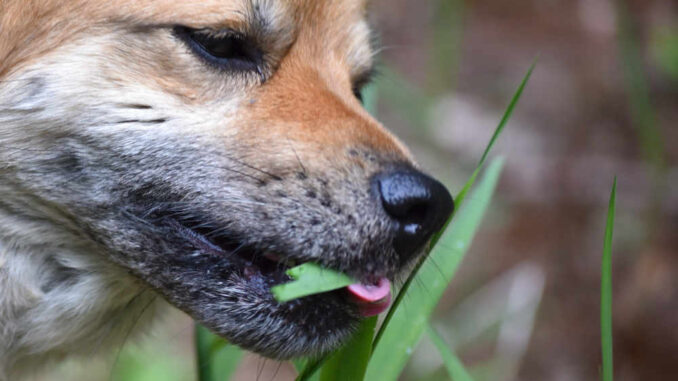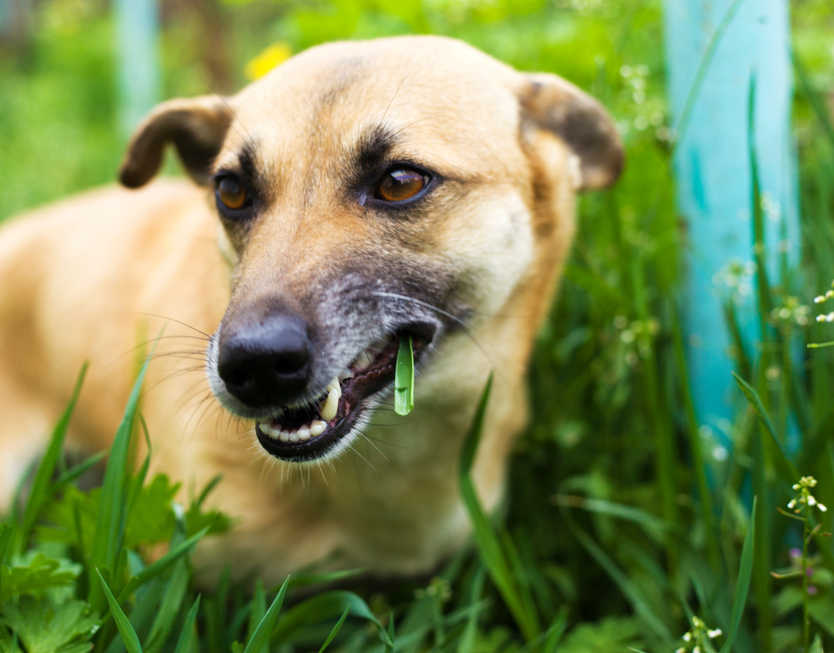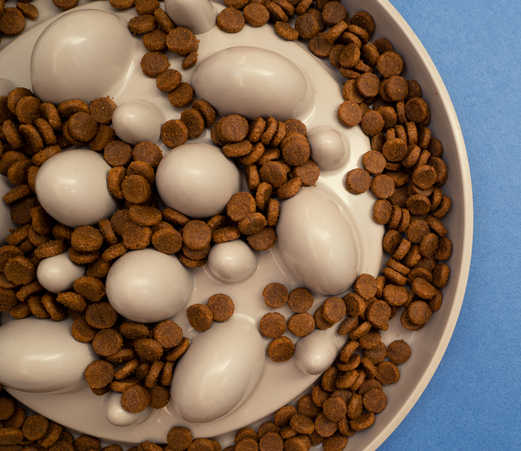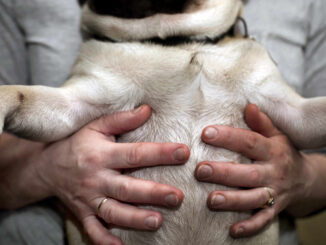
This article was updated on January 20th, 2024

Dogs’ stomachs often make gurgling sounds while digesting food, which is normal. However, the sounds may also signal digestive issues or even a medical problem. Eating grass is also a sign that the stomach might be upset. In this article, our veterinarians Dr. Liz Guise and Dr. Jamie Whittenburg explain when to be concerned and how to help your dog at home.
A combination of a gurgling stomach and grass-eating is likely a sign of a mild indigestion
“Stomach gurgling in dogs occurs when gas moves through the digestive system, and it’s generally normal. Eating grass and making loud gurgling sounds at the same time (with no other signs of illness) may indicate a mild indigestion.”
There are several reasons why dogs eat grass:
- It helps with digestion
- It eases nausea
- Some dogs like the flavor or texture of grass
- It helps stimulate vomiting
Grass eating is safe for dogs as long as they don’t graze excessively and there are no chemicals or fertilizers on the grass.
Four things to try at home to help with mild indigestions
If your dog’s stomach is gurgling and he’s eating grass, there are some things you can try at home to help relieve the symptoms. You should check with your vet before giving your dog any new diet, medication or supplements:

1. Give your dog probiotics to improve digestion and reduce gurgling. The live bacteria cultures can help foster a healthy gut flora that reduces the likelihood of indigestion. Here is an example product available on Amazon:
- Dispersible Powder - Contains naturally occurring probiotics. Supports a balanced digestive system and maintains overall health
2. Add digestive enzymes to your dog’s diet to assist with breaking down food and prevent an upset stomach. Consult with your veterinarian about which enzymes to give to your dog.
3. Feed a bland diet, such as boiled chicken and rice, to soothe your dog’s stomach. These materials are easier to digest than some dog foods, so they’re less likely to cause stomach upset and gas buildup. Read our article featuring proven bland diets for your dog.
4. Use a slow-feed bowl to slow down your dog’s eating. Some pups swallow air when they gulp their food. The extra gas in the stomach can cause loud gurgling and make your pooch nauseous.

Call your vet if your dog is showing other signs of illness such as vomiting or diarrhea
“It’s usually not concerning if your dog has a gurgling stomach and is eating grass (and is otherwise acting normal). However, when other signs are present, there could be an underlying medical problem. Call your veterinarian and schedule an exam if your pup shows other symptoms.”
Concerning signs include:
- Vomiting or diarrhea for more than a few days
- Loss of appetite for more than a few days: If your dog is also NOT eating, read our article “My dog’s stomach is gurgling & he is not eating“
- Inactivity or weakness
- Restlessness
- Excessive drooling
- Your dog has a swollen or painful abdomen
What are the most likely reasons for my dog’s stomach gurgling and eating grass?
Dogs eat grass and experience stomach gurgling for several different reasons.
1. Mild indigestion
Canines may instinctively munch grass when they’re feeling nauseous because it usually triggers vomiting. Naturally, if the grass comes up, so will the stomach contents that are causing your furbaby to feel sick. If your dog is eating grass to relieve indigestion, you may also notice him drooling or licking his lips.
2. Nutrient need
Sometimes, dogs will eat grass when they have a nutrient deficiency. They consume anything they can to replace the missing substances. Unfortunately, the grass isn’t likely to provide the nutrients your dog craves. If deficiencies are the trigger for your dog’s grazing, providing appropriate supplements should fix the problem (see next section for things you can try at home.)
3. Hunger
Some dogs will eat grass because they’re hungry, and the green stuff helps fill the stomach. The gurgling sounds can precede or follow grass ingestion in this case. Sometimes, the grass blades trigger extra stomach gurgling because they irritate the digestive lining.
4. They like it
There’s no accounting for taste with some pooches. Once some pups munch a little grass, they’ll keep doing it. They may like the flavor, or it could be the texture they find pleasurable. Either way, when the grass hits the stomach, it may irritate the lining and trigger rumbling sounds.
5. Stress
If you’re an emotional or stress eater, you’ll understand this one. Some dogs express their emotions viscerally. Anxiety can trigger stomach gurgling and indigestion. As a result, your pooch may turn to grazing grass for comfort. Dogs that experience stress may also resort to hiding or be extra clingy. See our recommendations for natural remedies to ease anxiety in dogs.
6. Other medical causes
In addition to the major reasons for a dog’s stomach gurgling and eating grass, other causes may be more concerning:
- Digestive tract illness or bacterial infection: vomiting, diarrhea or any other signs of illness means it is time to visit the vet.
- Intestinal blockage
- Parasites: parasites in a dog can potentially cause stomach gurgling and lead to behaviors like eating grass as a way to alleviate discomfort. For example, worms are fairly common. Signs of worms may include vomiting, diarrhea, weight loss, scooting, or visible worms in feces.
- Other medical conditions, such as liver disease or pancreatitis. With these diseases, you would also typically see other signs of illness such as yellowing of the skin and eyes, vomiting, diarrhea, lethargy, or loss of appetite.
If your dog is also NOT eating, read: My dog’s stomach is gurgling & he is not eating.
Treatment options
When you bring your dog to the veterinarian for an exam, he’ll evaluate your pup’s condition and run some diagnostic tests like x-rays, blood work, and a fecal exam. Based on his findings, the doctor will recommend a course of treatment that may include
- Fluid therapy to correct dehydration and electrolyte imbalances
- Anti-parasitic drugs to eliminate worms from the system
- Antibiotics to treat any bacterial infections
- Antinausea drugs to ease indigestion
- Surgical removal of intestinal obstructions
Frequently asked questions
Do stomach noises cause your dog pain?
Normal gurgling sounds from digestion don’t tend to cause your dog pain. However, if your pooch has excess gas in the stomach, or if an infection or condition is triggering the rumbling sounds, your pup can feel pain or discomfort.
Do dogs eat grass when their stomachs hurt?
Dogs may try eating grass to relieve an upset stomach. Their systems can’t digest the roughage, so it’s usually expelled along with the stomach’s contents. When your dog vomits, it removes the materials that are making your pooch feel uncomfortable and sick.
Is Pepto Bismol a good option for dogs with gurgling stomach issues?
Pepto Bismol should be avoided in dogs unless directed by their veterinarian. This medication contains salicylates, which can be a cause of ulcers and gastric bleeding and may interact with other medications. Always consult with your veterinarian first to ensure safety.
Related posts:






Disclaimer: This website's content is not a substitute for veterinary care. Always consult with your veterinarian for healthcare decisions. Read More.







Be the first to comment